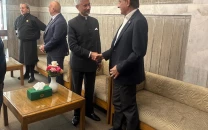Fear
Pakistan is under threat from forces that constantly attempt to undermine democracy and fundamental rights

In 1972 the South African criminologist, Stanley Cohen, coined the term ‘moral panic’. A moral panic occurred when: “a condition, episode, person or group of persons emerges to become defined as a threat to societal values and interests; its nature is presented in a stylised and stereotypical fashion by the mass media and politicians.”
Cohen analysed how politicians and the media created a moral panic around rock and roll sub-cultures in the 1960s. These sub-cultures were seen as a source of corruption for the youth. The hysteria generated by this was used to justify enhanced police powers.
Cohen concluded that the threat from the rocker sub-culture was never as severe or alarming as was posed to the public. That is the way moral panics operate — the threat is never as objectively dangerous as it is portrayed to be.
Moral panics, and the culture of fear they produce, serve autocrats quite well. It grants them the fuel needed to burn legal safeguards amidst thunderous applause from the public. Across the world, fear continues to be the favourite narrative of populist strong men. From Trump to Orban, fear is the language they speak to fool people into giving up their rights.
Think back to how the United States invaded Iraq. Bush and his warmongering acolytes of Rumsfeld and Cheney made the American people believe they were under threat of an imminent attack from foreign soil. The haze of fear was so heavy around the eyes of the American people that they blindly pulled the trigger on the invasion of Iraq despite not having all the facts. They would support the setting up of a separate prison in Guantanamo Bay where torture and cruelty would reign. They would nod with approval when due process was offered up to the gods of fear and loathing to achieve the Patriot Act. And more recently, the Trump presidency succeeded in creating a culture of fear around Muslim immigrants in order to impose a discriminatory ban on them entering the country.
Closer to home, neighbouring India is led by a man who has made populist fear-mongering his hallmark. Modi warns of a Muslim threat to India and enacts a citizenship law that discriminates on the basis of faith. The threat of India losing its Hindu identity has allowed him to dominate polls and recreate the secular character of India — all with the blessings of the majority of the population.
These examples demonstrate just how easy it becomes to restrict and violate fundamental rights when a moral panic is in full swing.
Which is perhaps why it is a philosophy that best explains the arbitrary way in which Pakistan’s fundamental rights have been treated throughout its history.
You see, Pakistan has been a nation dominated by a narrative of fear ever since its creation. To be sure, initially there was some justification for this — it was a small nation lacking infrastructure with a hostile country at its border.
But the perceived threat from India has allowed the Pakistan military to wield disproportionate power over the country.
Think about it, doesn’t there always seem to be some threat to the country? Someone lurking in the shadows; against our religion, our values, our customs, our culture. It isn’t a coincidence that every military dictator who has ever seized control of this country has done so while speaking of unprecedented threats.
What rights have we given to put our national fear at ease? Due process is the most obvious one. We have become a country where extrajudicial murder is common as a quick and brutal solution to any threat. When terrorism reared its head, we enacted the Protection of Pakistan Act which allowed arbitrary detentions and a reversal of the burden of proof. When last year the draconian KP Actions (in Aid of Civil Powers) Ordinance was enacted, it was justified by the ‘unprecedented’ security situation in the province.
Free speech is another battered and bruised victim of our fear. Any speech critical of the status quo is seen as treacherous. Such is our national insecurity. The justifications always point to a pending disaster: the Aurat March must be banned because it is a threat to our values; TikTok will turn our youth into rapists; investigative journalism is done by Indian spies; ethnic civil rights movements are funded by foreign powers; federalism will cause a civil war. And on and on it goes, one panic to justify the curtailing of one right after another.
Strong constitutions backed by independent judges are supposed to prevent the rule by fear. Unfortunately, our judges are busy building dams. Our constitutional history shows that in the majority of cases where the judiciary has been called upon to check the curtailing of fundamental rights in the name of national security, morality, and decency, they have given more importance to the restrictions on fundamental rights rather than the rights themselves.
Pakistan is under threat. It is under threat from forces that constantly attempt to undermine democracy and fundamental rights. Forces that keep attempting to justify chipping away at the right to question this status quo of paranoia we currently live in. If no person wishes to live a life in fear, why have we become a nation so comfortable with living like this? We must question the narratives that are thrust upon us to justify taking away our liberties.
The only thing we have to fear, is fear itself.
Published in The Express Tribune, September 29th, 2020.
Like Opinion & Editorial on Facebook, follow @ETOpEd on Twitter to receive all updates on all our daily pieces.














COMMENTS
Comments are moderated and generally will be posted if they are on-topic and not abusive.
For more information, please see our Comments FAQ